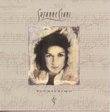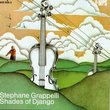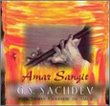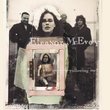| All Artists: Stephan Micus Title: Garden of Mirrors Members Wishing: 3 Total Copies: 0 Label: ECM Records Original Release Date: 7/18/2000 Release Date: 7/18/2000 Genres: Dance & Electronic, International Music, Jazz, Special Interest, New Age, Pop Styles: Ambient, Techno, Jazz Fusion, Vocal Jazz, Experimental Music, Meditation, Vocal Pop Number of Discs: 1 SwapaCD Credits: 1 UPCs: 731453716223, 0731453716223 |
Search - Stephan Micus :: Garden of Mirrors
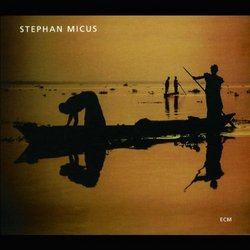 | Stephan Micus Garden of Mirrors Genres: Dance & Electronic, International Music, Jazz, Special Interest, New Age, Pop
Multi-instrumentalist and composer Stephan Micus is a unique explorer of sonorities, wandering the world to study instruments from a host of heritages. His work is marked by a simultaneous interest in the instruments' dist... more » |
Larger Image |
CD DetailsSynopsis
Amazon.com Multi-instrumentalist and composer Stephan Micus is a unique explorer of sonorities, wandering the world to study instruments from a host of heritages. His work is marked by a simultaneous interest in the instruments' distinctive properties and original uses and his own vision. For the nine-part Garden of Mirrors, Micus has added to his instrumental palette with bolombatto and sinding, two lower-register West African harps with attached tin rattles. These are used here to accompany vocals or are joined in various configurations with a complement of ethnic flutes--including Japanese shakuhachi, Balinese suling, Egyptian nay, and an Irish tin whistle--as well as steel drums, and Micus's voice is overdubbed to a 20-member chorale on three tracks. The results are often hypnotic, combining hyper-resonant instruments with static five-tone scales and chanted micro-melodies. On "Passing Cloud," the shakuhachi wafts over a slowly pulsing field of four steel drums and two sinding, while "Gates of Fire" uses bowed sinding to add introductory menace to a stately processional orchestra of percussion, steel drums, and a dozen overdubs of the various flutes. On "Flowers in Chaos," a single high-pitched suling expands to 22, arriving like a flock of exotic birds. It's not just the cross-cultural content of these instruments that makes the music distinctive. Their sounds are close to nature, whether evoking birds or rivers, wind or rain. Micus's wordless singing never mimics a single culture; the pieces are as apt to suggest Native American music as the South African townships or India. In Micus's meditations, technology can turn the one voice into many, or merge diverse elements into a united dreamscape. --Stuart Broomer Similarly Requested CDs
|
CD ReviewsWonderful Micus...But Typical John Grunwell | Washington, D.C. | 09/28/2000 (4 out of 5 stars) "I have no idea how I ever learned of the existence of Stephan Micus' work, but it was probably sometime back in high school when I "got into world music." My early experiences of his music were stunning, and in his music I found great depth and beauty. However, as I heard more and more, a certain sameness was apparent in all of his music. It's all ethereal, and it's all melodic (in a sense...except the "...Stones" album, in which he hits rocks or something), but I've found that barring differences in instrumentation, the *music* is often quite similar in theme and feeling. That being said, this new one (with yet another great ECMish cover) is just as strong a work as "Darkness and Light," but perhaps - in my opinion - not as strong as "Athos" (I *love* that one; what the *heck* is a sattar and where can I hear more of that thing!?). If you're a fan of Micus, by all means purchase this CD. If you're looking for an interesting, indefinable, "world music" listening experience that none of your friends know about, buy this album. If you're familiar with his earlier works and are expecting something breathtakingly new, this is *NOT* the album to buy. Still, it's better than most New Agey, "world music" recordings out there on the market." His best so far C. H Smith | Bowling Green, Kentucky United States | 09/23/2000 (5 out of 5 stars) "I have now had a chance to study Micus' most recent release, and can only speak of it in terms of superlatives. In some respects it is standard Micus fare--which is to say vaguely folk-inspired "New Music" with the artist supplying all musical parts and the pseudo-word vocals; and yes, you get the usual array of exotic instruments (Micus plays over twenty instruments at a reasonable level of proficiency, including several flutes and rather strange stringed instruments, hammered dulcimer, steel drums, etc., etc.). Moreover, the work on this album still exhibits perhaps his single most obvious flaw: how to satisfactorily end a piece. But... This is a truly superb concept album, on a par with Dead Can Dance's "Spiritchaser," though a bit less commercial sounding, and thankfully lacking that group's occasional lapses into pretentiousness. Each piece on the cd reflects one mirror-image or another of Micus' (and our own?) psychological garden, with extremely satisfying results. There are precious few artists who can portray emotions like regret and solitude, much less come up with something that is actually thrilling to listen to, but Micus can. And lest I give the impression that this is a sombre album--well, it isn't. Two of the three vocal pieces are his best yet, apparently using West African models to weave together some of the most inspiringly positive musical sounds I have ever heard--real pure, honest, joyful stuff. The only thing I can think of at the moment to compare it to emotionally is the famous Requiem by Gabriel Faure, which manages to celebrate the delivery of the soul to a higher place in a manner devoid of religious baggage and mere ceremony--that is to say, with dignity and respect for what is truly good in us. Needless to say, I would very highly recommend this album to anyone who needs their music to be not only honest, but emotionally insightful." African Hypnosis Phillip Armour | Deer Park, IL USA | 01/30/2003 (5 out of 5 stars) "Garden of Mirrors is playing now. It is light and lyrical and more than a little hypnotic. Based on a variety of African flute and percussion instruments, most of the tracks build up on themes that morph and weave but never seem to reach an end. It reminds me of Balinese Rindik music in that. You can come in the middle of a song and not know it is the middle. It is light, but not without substance, it's just that the music does not force itself on you. It is easy to listen to and easy not to listen to. When it catches your attention, it has much to say. But it doesn't demand you listen. Micus's overlaid chanting and chanting is very well done, ethereal, textured, and occasionally driving. I don't know if he is actually singing in a real language, but the texture of what he sings conveys the meaning and emotion without the need for intellectual understanding of the words. It is good music to work to."
|

 Track Listings (9) - Disc #1
Track Listings (9) - Disc #1
